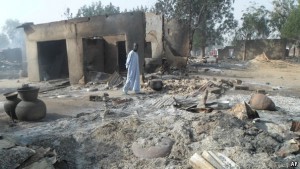On saturday evening, carloads of Boko Haram insurgents descended on the northern Nigerian village of Dalori, where they set fire to houses, shot residents, and detonated bombs amid fleeing crowds. Pictures show the place razed to the ground. At least 85 people died, authorities say. Many bodies were charred beyond recognition. Even the cattle were killed.
For people in these parts such appalling tales are all too familiar. Nigeria’s marauding jihadists, whose name is roughly translated as “Western education is forbidden”, have been pushed back in the past year, yet they still frequently unleash their wrath on the four countries of the Lake Chad basin. This episode, however, is particularly worrying for several reasons.
The first is that it seems to have been so well organised. One security expert with links to Nigeria’s intelligence services says that more than a hundred militants may have been involved in the raid. And it was brutal, even by the bloody standards already set by the jihadists. Locals reported hearing children screaming as they were incinerated in their burning homes.
The army’s response, by contrast, was particularly feeble. The jihadists have taken to using hit-and-run tactics—raiding rural settlements for food, money and human chattel—since they were rebuffed in their efforts to take and hold territory in early in 2015. Defending scattered villages against such attacks is difficult. But Dalori—which is located 5km (3 miles) from Maiduguri, a state capital and the military’s headquarters—was an audacious choice of target. It seems likely that the militants drove there from their remote hideouts over roads patrolled by soldiers and vigilantes. Yet they were not stopped. In Maiduguri townspeople said they could see houses burning. Yet soldiers based in Maiduguri allowed Boko Haram to pillage Dalori for hours before driving them out.
Nigeria’s army has been similarly embarrassed in the past (they had hours of warning before girls were kidnapped in Chibok two years ago, yet did not act), but not of late. Soldiers were better armed ahead of an offensive early last year. Morale soared when Muhammadu Buhari, a former military ruler who promised to stamp out the insurgency, became president in May. And there have been efforts to clamp down on the corruption that has starved front-line troops of the guns and ammunition they need. In the past few months both the former national-security adviser and an ex-minister of defence have been arrested on charges of looting funds meant for the fight against Boko Haram. Yet this weekend’s massacre suggests that Nigeria’s army has not resolved all of its problems.
Continuing complaints about ammunition shortages, despite efforts to equip the soliders better, could explain the slow response. So too could poor communications and inadequate training. “They don’t attack. They just wait for something terrible to happen,” the security professional says. Another point of concern is the army’s alleged involvement in war crimes and abuses of human rights—hardly the sorts of things likely to engender trust among local villagers whose support is needed. Such worries were brought to a head when the government recently reinstated Ahmadu Mohammed, a major-general accused by Amnesty International, an international human rights pressure group, of involvement in the deaths of more than 8,000 detainees held by the security services. He retired in 2014 for unrelated reasons, but his return, without an inquiry, shows a “monumental failure of the government to stamp out impunity,” Amnesty said.
Nigeria’s forces are in an unenviable position. They face an uprising in the south-east, militants in the oil-producing Niger delta and sectarian clashes in the centre. Meanwhile, falling oil prices are putting pressure on military spending, says John Campbell, former American ambassador to Nigeria. A regional response could help, but soldiers belonging to a “multinational joint task force”—to which Nigeria has allocated millions of dollars—barely communicate with one another. Mr Buhari thinks that Boko Haram is “technically defeated” because it holds little in the way of land. Yet it has been weakened in the past, only to regroup. Without a more proactive response from the army, it will do so again.
economist.com



